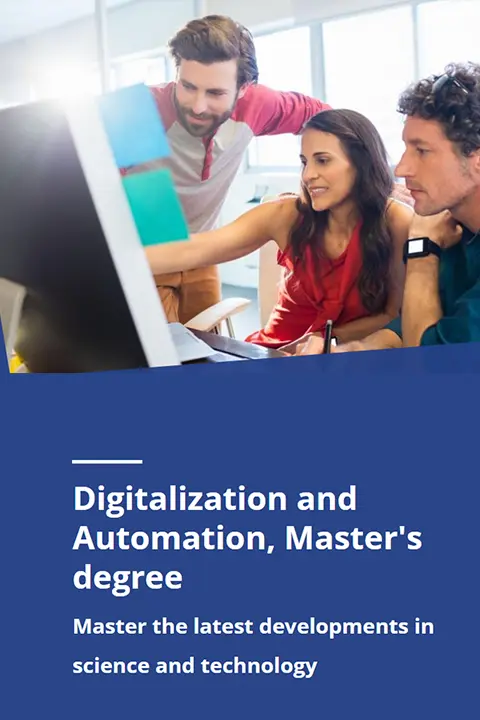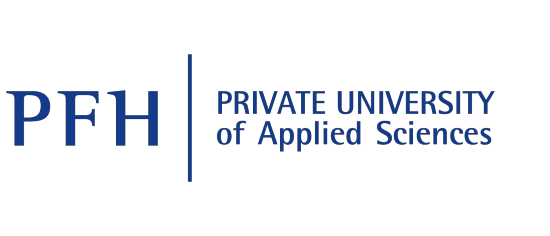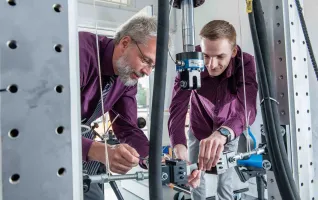

Masters of Digitalization & Automation

Shape The Digital and Robotised World
Do you like to break new ground and use digital and automated approaches to do so? Would you like to study the latest developments in science and technology? The Digitalization and Automation study program is aimed at graduates of electrical engineering, mechanical engineering, computer science and industrial engineering. In the field of robotics, programming and technology, you will be introduced to new developments and future-oriented topics.
The special features of the newly created curriculum are the advanced study contents and varied teaching activities, such as interactive lectures and practical experiments. The future of Master’s graduates is the digital, computerized and robotized world. You will develop a comprehensive understanding of digitalization and automation and your studies will prepare you in the best possible way to apply your knowledge in those fields.
Study Content
The Master’s program lasts four semesters, in which you acquire the skills to work in companies in the area of engineering and data processing, but to also be a production manager, factory planner and strategic planner. You will gain practical knowledge through numerous projects and case studies in each semester. In preparation for the job market, you will not only acquire the needed theoretical knowledge but relevant knowledge for modern tools to optimize the effectiveness of the processes. A scientific-theoretical orientation of the master’s program is shown in the examination of current research statuses in the lectures, as well as in the preparation of scientific papers.
Module 1: Advanced Mathematics and Technical Mechanics
Advanced Mathematics
Advanced Technical Mechanics
Module 2: In-depth Project Management
Agile Project Management
Digital Factory Planning
Module 3: Big Data
Machine Learning
OLAP and Data Mining
Module 4: Innovation and Digital Transformation‘
Digital Business Models
Innovation and Start-up Management
Module 5: Law and Ethics
Engineering Ethics
Patent Law and Innovation Protection
Module 6: Sustainable Development / Circular Economy
Sustainable Structural Design
Circular Economy
Module 7: Sensor Technology and Applications
Measurement and Control Technology
Sensor Technology
Module 8: Automation
Programmable Logic Controllers
Actuators and Sensors in Automation and Robotics
Module 9: Information Technology and Cyber Security
Hazards and Security Measures
Data, Information and Knowledge Technologies
Module 10: Digital Technologies
Industrial Internet of Things (IIoT)
Applied Simulation / Virtual, Augmented, Mixed Reality
Module 11: Management Accounting
Internal Accounting and Controlling
Finance and Risk Management
Module 12: Change Management and Leadership
Change Management
Leadership
Module 13: Quality Assurance and Control
Quality Techniques and Procedures
Non-destructive Testing (NDT)
Module 14: Robotics
Applied Robotics
Applied Control of Dynamic Systems
Module 15: Digital Image Processing
Digital Signal Processing’
Digital Image Transformation
Module 16: Laboratory Automation
Laboratory Automation
Module 17: Project / Internship
Research Methods
Internship
Project Work
Module 18: Master Thesis
Master’s Thesis and Disputation
Course Details
- Degree : MS - 120 ECTS
- Duration : 4 Semesters
- Location : Stade (Hamburg)
- Start Date : April 1st | October 1st
- Tuition Fee : € 5400 / Semester
Why PFH?
- 100% Job Guarantee
- 500+ Partner Companies
- 50+ International Partner Universities
- English Taught
- Hassle-Free Admission
- Scholarship Available
Start 2025 with a Scholarship!
PFH has launched a scholarship scheme in Master’s programme for Indian students.
Apply now for a limited scholarship covering a minimum 20% of your fees!
University Partners
Collaborative partnerships with other universities enable joint research projects, support the permeability of available courses for students of the respective other university and pave the way for PFH graduates to undertake doctoral projects at the respective partner university.
Through international university partnerships, PFH creates the structures for student exchanges and academic qualifications in the respective countries.
Admission Process for MS in Germany at PFH
- Apply for Admission
- Fill out our online form to register for your program. We will email you the pre-filled contract for review.
- Gather the required documents which are given on the website.
- Submit the completed application form.
- Applicants will be contacted by our admissions team regarding the documents required for admission and recognition.
Requirements for MS in Germany at PFH
Completed university degree in (industrial) engineering, a technical-scientific area or a closely related subject
Documents Required
- Curriculum vitae
- Higher education entrance qualification
- Copy of passport
- Digital photo
- Letter of motivation
- Employment references
- Letter of recommendation
- Statement of purpose
- Proof of language proficiency in German or English
Jobs after MS in Germany at PFH
With the Master of Science in Digitalization and Automation, you will qualify to work in companies, organisations and start-ups as a production manager, factory planner and strategic planner. You will be able to better understand, shape and lead the increasingly digitalized industry of the future.
- Product Manager
- Factory Planning
- Strategic Planning
MS in Germany Scholarship at PFH
The students can avail of scholarships in Germany to help them lower their expenses for pursuing the management program. Students from other countries are also allowed to do part-time jobs for 20 hours per week. With the benefit of practical experience in their field of interest, they also get international exposure. These jobs help them to earn while they study and lessen their financial burden. Many universities run various scholarships for MBA in Germany to help deserving students. The top scholarships that are awarded to the students are:
Global Study Award Scholarship- is given in association with study portals, ISIC, and British Council. The main motive behind this scholarship is to encourage students to study abroad, explore new countries, culture and learn a new language. The maximum amount of scholarship is GBP 10,000.
Central Sector Scheme of National Overseas Scholarship- it provides financial help to selected students aspiring to study MBA in Germany from reputed universities. It is awarded to 100 students with an amount of USD 33,800.
The Financial Sumo Educational Scholarship Program- helps students to lessen their financial burden on college students. This scholarship is awarded to only one student with a maximum amount of USD 1000.
Broker Fish International Student Scholarship- this is to aid international students to ease their financial costs during their stay in a foreign country. The maximum amount of this scholarship is USD 1000.
Go Clean Scholarship- to the students who are hard-working and dedicated. This merit-based scholarship requires the students to write an article on the topic “How to keep the environment green and clean” and helps the student with an amount of USD 3500.
Pursuing scholarships, such as the prestigious DAAD Scholarship, can significantly reduce your financial burdens. At PFH, we support you in your educational goals. You can choose from several scholarship options such as:
- Deutschlandstipendium/Germany Scholarship
- STIBET-Programme
- DAAD Prize
- Erasmus Scholarship Programmes
- Friedrich-Ebert Stiftung
- Heinrich Böll Foundation
- Konrad-Adenauer Stiftung
Completing your MS in Germany from PFH not only offers world-class education but also offers various visa benefits such as:
- PFH Graduates can explore career opportunities by availing the 18 month post-study work visa (PSW).
- PFH Graduates can also apply for job seeker visa
- Work visa for qualified professionals is issued for a maximum period of 4 years
- People who are non-EU nationals can receive the EU blue card
Our Industry Partners
PFH University Board of Trustees (13 world famous companies) and its more than 500 partner companies, the University has excellent links to business throughout Germany and, particularly in the regions of Göttingen and Stade, is embedded in a largely SME-oriented company environment.
Frequently Asked Questions
At PFH University, you can apply at any time.
- Application form via our website
- Curriculum vitae
- Higher education entrance qualification
- Copy of passport
- Digital photo
- Letter of motivation
- Employment references
- Letter of recommendation
Yes, you will need proof of advanced English language skills, e.g. Bachelor’s taught in English, TOEFL, IELTS, ESOL CAE or BEC Higher.
If you are a citizen of a country in the EU, EEA or Switzerland, you do not require a visa or other documentation to enter Germany and study here. However, once you arrive and find accommodation, you must register with the local residents’ registration office.
If you are coming from a country other than the ones named above, you will require a visa. For more information specific to your home country, please visit the Federal Foreign Office website.
At PFH University, we offer international students three types of scholarships:
- STIBET-Programmes
- DAAD Prize
- Deutschland Stipendium/Germany Scholarship
For more information on each of the scholarships, click here.
During your studies, you are generally allowed to do 120 full days or 240 half-days of paid work and take small student jobs. In exceptional circumstances, your local foreigners office may impose further restrictions.
International students coming to Germany have two options when it comes to accommodation: student halls of residence and private accommodation. For more information, you can visit the Accommodation Finder from the Federal Ministry of Education and Research or contact our international office.
When you compare Germany to other European countries, you’ll find that it’s not very expensive. The living costs are just slightly higher than the EU average, with rent being the largest expense. On average, students in Germany spend around 850 EUR per month (750 EUR in Göttingen for the management degree).
Questions - Always Welcome
Do you still have questions about your studies? We are by your side! Our consulting team can be reached under the following contact options.







